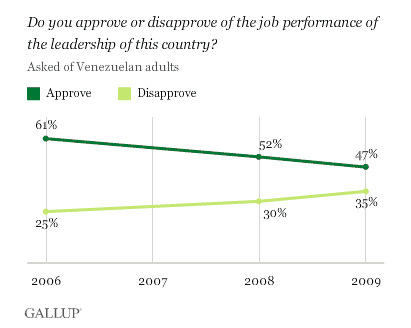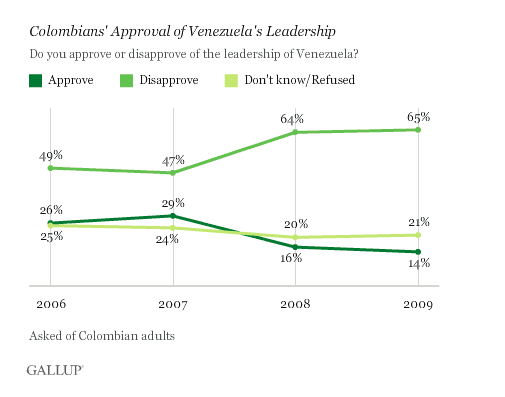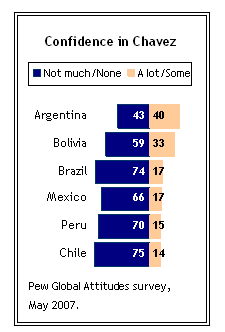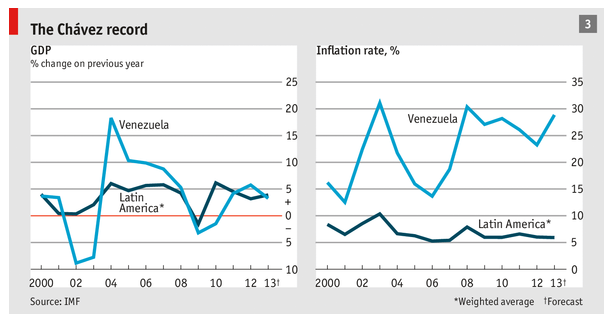Chavismo in charts (WAPO)
 Thursday, March 7, 2013 at 9:32AM
Thursday, March 7, 2013 at 9:32AM Great article that seeks to explain successes and failures of Huge Chavez in charts.
Here they are the four that attracted my attention, as they represent judgment by peers (and not the US):

So he was clearly slipping inside the country, although his strong-arm populism still captured about half the population.

Colombia is where Chavez did his most meddling: supporting insurgents and setting up his regime as a trans-shipper of narcotics into North America. Clearly no love-loss there.

The countries where the middle class is growing (and Bolivia - considered in the Chavismo camp). Even in Bolivia, 60% don't have any real confidence in the man. The continent's real players, Brazil and Chile, clearly wanted nothing to do with the man - whatever false praise was heaped on him by Brasilia.

The economic record indicates a moment of Putinesque "brilliance" afforded by high energy prices mid-decade, and then run-of-the-mill performance during which antipathy grows within the country regarding his heavy-handedness - only natural. The big failure was on inflation, the long-time scourge of the region. Stunning failure there that represented his tendency to "eat the seed corn." That's the truly painful legacy: Chavez ran down the oil industry and it'll take a while to get it back to its true potential.
So a good show, but no more lasting impact that any previous populist demagogue and strong-man.










Reader Comments (6)
"Chavez ran down the oil industry and it'll take a while to get it back to its true potential."
Here we have a massive understatement. I would restate this is this fashion:
Chavez squandered Venezuela's oil resources by failing to exploit a period of relatively high oil prices and in fact Venzuela's export volume today is only about 70% of it's previous peak. Venezuela has tremendous potential reserves, but Venezuela's crude is some of the worlds's most difficult and expensive to extract. Such reserves require access to the world's best technology and partnership with those international firms possessing these technologies and expertise. Unfortunately Chiavez not only succeeded iin driving out the best potential foreign partners, he also managed to lose much of the original Venezuelan core of oil and gas expertise. Now bring this forward to the present day. Due in part to a long period of relatively high prices and the resulting technology and ingenuity to expolit previously impractical resources, there are now many potential sources of oil and gas in much more stable countries than Venezuela that offer the prospect of prices quite competitive to marginal supply from Venezuela. In other words, Chavez may have destroyed his countries oil and gas export prospects for generations and condemned his country to no better than sluggish growth for decades.
But Chavez had also his positive side. The poor got a welfare state and subsidies for food and other goods of daily life, youth unemployment rates dropped and he introduced a mixed economy--not comparable to the Eastern Bloc or Cuba.The idea for his "socialism of the 21st century" originates from the German thinker Dieter Heinrichs with whom Chavez became a good friend.However, we will see if the socialism of the 21st century was just a one-man-personality-show or will survive the death of its maximo leader and commandante.
What Tom Barnett doesn´t mention is the situation Venezuela has been in the time before Chavez seized power. Corruption, mass unemployment, poverty, cheap oil for the 7 oil sisters, an oligarchy which ripped off the country from its wealth and gave nothing to the masses--because of this Chavez became popular and he invented a third way: Not Che Guevara and focus guerilla, not Allende´s parlamentarian style which brought him Pinochte´s bloody coup d´etat, but a mix between popular power of the masses and support by the military. My main point of criticism is: That Chavez didn´t establish a future fonds like Putin which invested the oil revenues in more technology centers and infrastructure.But the oligarchs`goverments before also didn´t do that and there was no critic by the USA which got cheap oil from Venezuela and didn´t care about the rest. And why only critizising Chavez? What about Saudi Arabia which also isn´t investing in new technologies? That´s hyporcacy.
This from Tom Holland of the South China Morning Post :Meanwhile, the Chavez government lashed out some US$20 billion a year on energy subsidies, more than twice the amount it spent on education. Ordinary Venezuelans were able to buy petrol at just 1 per cent of the price paid by motorists in Hong Kong, while the handouts for business were so generous that corporate tax rates were effectively negative.
Not surprisingly, domestic oil consumption almost doubled. As a result, despite surging international demand, under Chavez Venezuela's oil exports collapsed by more than a third.
The effect on Venezuela's economy was devastating. Loose monetary policies combined with profligate government spending meant that consumer inflation stayed in double figures throughout Chavez's presidency. In January, the inflation rate hit 21.6 per cent.
In response, Chavez's government was forced to devalue Venezuela's currency repeatedly, with the most recent 30 per cent devaluation coming last month. Altogether over the course of Chavez's presidency, the bolivar lost more than 90 per cent of its value against the US dollar. And that was during a period when the dollar itself declined 18 per cent in value against a basket of currencies.
No doubt enthusiasts for Chavez's brand of Bolivarian socialism will attempt to defend his economic record by claiming his policies benefited Venezuela's poor and narrowed the country's income divide.
Yes, it is true that between 1998 and 2006 (the last year for which figures are available) Venezuela's Gini co-efficient of income inequality dropped by 3 percentage points.
But that narrowing did nothing for the country's poor. According to World Bank figures, when Chavez took over, the poorest 10 per cent of Venezuelans took home just 1 per cent of the country's household income. By 2006, that share had not changed, with the poorest 10 per cent still earning only a 1 per cent share of total income.
In the meantime, the total size of Venezuela's income pie barely expanded. Between 1998 and 2011, the country's per capita income grew by just 10 per cent in real terms.
To put that into perspective, compare Venezuela with Chile, another South American country blessed with natural resources where the Gini co-efficient has also declined.
Between 1998 and 2011, Chile's income per head shot up by 40 per cent, with the share taken home by the poorest 10 per cent rising by a quarter.
In short, for all his colourful costumes, Chavez was an economic disaster. If he was a clown, then ordinary Venezuelans paid a ruinous price for our entertainment. "
David Dunn:
"Ordinary Venezuelans were able to buy petrol at just 1 per cent of the price paid by motorists in Hong Kong, while the handouts for business were so generous that corporate tax rates were effectively negative.
Not surprisingly, domestic oil consumption almost doubled. As a result, despite surging international demand, under Chavez Venezuela's oil exports collapsed by more than a third."
That´s a typical imperialist point of view: Venezuela has to serve the big oil sisters and
to exportall of its oil. Its a big achievement that Chavez used the Venezualian oil first for his own people and then for export.David Dunn doesn´t like the idea that "ordinary" Venezualians can afford oil for their cars, transport system, cooking, heating,agriculture, etc.And aren´t those costs also an importnat extra income for the poor?
I come from Nigeria, another chronically mismanaged petro-state like Venezuela - and I understand where Chavez is coming from.
There are a few choices; you can maintain a healthy balance of payment, keep foreign investors happy and keep employment levels very low (the Oil and Gas sector is very technical and only employs very few people) or can you make social welfare your focus or you can combine a bit of both.
Lost from a lot of the commentary on Chavez is a discussion on the situation prior to Chavez. Chavez almost halved the number of people living below poverty, so Venezuela (with a poverty rate of close to 50% before Chavez arrived), wasn't working for the poor.
This is what we need to consider, it not all about trade surpluses and positive recommendations from the IMF & investment bankers: income inequality counts - and in far too many nations in the developing World it is driving conflict.
Again let me get to Nigeria, if Nigeria had a Chavez, Boko Haram & militancy in the Niger Delta would be less likely. True, we might have an unsustainable trade deficit, but we would have less unemployment, higher literacy rates & lower maternal mortality rates.
I worked at both KPMG & Accenture, so I'm no "socialist", but I also live in Lagos & can see how social problems impact on both my future and the future of my children.
This isn't a time for ideologies or textbook economics, the World needs to critically examine the importance social welfare.
NB: Lula was working with a more diversified economy than Chavez, Lula HAD to do what he did. With Chavez, it was optional, he had oil.